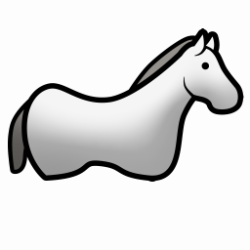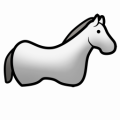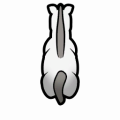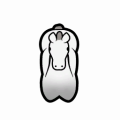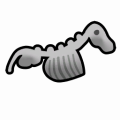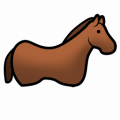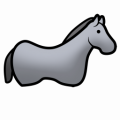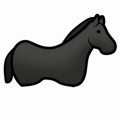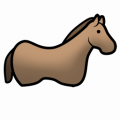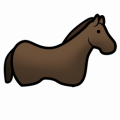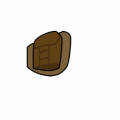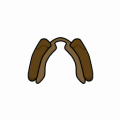Horse
Horse
A large hoofed mammal with a short coat, a long mane, and a long tail. Horses have been domesticated since ancient times.
When in a caravan, people can ride horses to increase the caravan's speed.
Base Stats
- Type
- Animal
- Flammability
- 70%
Pawn Stats
- Combat Power
- 100
- Move Speed
- 5.8 c/s
- Health Scale
- 175% HP
- Body Size
- 2.4
- Mass - Baby
- 28.8 kg
- Mass - Juvenile
- 72 kg
- Mass - Adult
- 144 kg
- Pack Capacity
- 84 kg
- Carrying Capacity
- 180 kg
- Riding Speed
- 1.6
- Filth Rate
- 16
- Hunger Rate
- 0.68 Nutrition/Day
- Diet
- herbivorous
- Life Expectancy
- 30 years
- Manhunter Chance
- 0%
- Manhunter Chance (Taming)
- 0%
- Trainable Intelligence
- None
- Wildness
- 35%
- Minimum Handling Skill
- 2
- Roam Interval
- 2 days
- Mate Interval
- 12 hours
- Maturity Age
- 0.333 years (20 days)
- Juvenile Age
- 0.25 years (15 days)
- Comfortable Temp Range
- -35 °C – 45 °C (-31 °F – 113 °F)
Production
- Meat Yield
- 336
 horse meat
horse meat - Leather Yield
- 96
 plainleather
plainleather - Gestation Period
- 6.66 days
- Offspring Per Birth
- 1
Melee Combat
- Attack 1
- Head
10 dmg (Blunt)
15 % AP
2.9 second cooldown - Attack 2
- Front left leg
7 dmg (Blunt)
10 % AP
2 second cooldown - Attack 3
- Front left leg
7 dmg (Poke)
10 % AP
2 second cooldown - Attack 4
- Front right leg
7 dmg (Blunt)
10 % AP
2 second cooldown - Attack 5
- Front right leg
7 dmg (Poke)
10 % AP
2 second cooldown - Attack 6
- Teeth
5 dmg (Bite)
7 % AP
2 second cooldown
0.5 chance factor - Average DPS
- 2.06
- tradeTags
- AnimalFarm, AnimalCommon
Horses, called Mares if female and Stallions if male and foals as babies, are tameable herbivores with a fast movement speed.
Horses can come in a variety of different colors: White, Gray, Black, Brown, and Light Brown.
Acquisition
Horses can be found in temperate forests, temperate swamps, arid shrublands, and boreal forests. They can either be tamed by a handler or self-tame in a random event, and can be bought and sold in other faction bases and from bulk goods traders. Horses purchased from traders will be already tamed.
Summary
Horses are pen animals. Once tamed, pen animals cannot and do not need to be trained any further. But if left outside of a pen or caravan hitching spot, pen animals will eventually roam outside your colony. Making a caravan is not required to tie animals to a caravan hitching spot.
Horses are also pack animals, and will carry up to 84 kg of weight in a caravan. They can additionally be ridden for up to 160% caravan speed, the highest of any animal (tied with the thrumbo).
Analysis
Pack animal
Horses are easily the best pack animal in the game. They are tied with thrumbos for the highest caravan speed bonus in the game, and thrumbos refuse to carry goods. In addition, horses carry the most weight per unit nutrition. For the fastest riding speed, you should have at least 1 horse for every colonist you send on a caravan.
They also make for a great slaughter animal.
Nutrition
When slaughtered, a horse yields 67 meat and 25 leather as a baby; 168 meat and 48 as a juvenile; or 336 meat and 96 leather as an adult. 1 meat is equal to 0.05 nutrition.
An adult horse consumes 0.68 nutrition per day, and a female creates up to 0.15 offspring per day.
- When offspring are slaughtered as babies, a mare will produce 0.5 nutrition of meat per day, giving an optimal nutrition efficiency of 74%.
- If the offspring are allowed to grow to adulthood, they will consume an additional 1 nutrition per day, but will instead yield 2.52 nutrition per day as they are slaughtered, resulting in an optimal nutrition efficiency of 150.6%.
When considering a population of equal numbers of males and females, these nutrition efficiencies fall to 37% for baby slaughter and 107.1% for adult slaughter.
Horses are even better than cows. Their biggest competitors for the niche of a low work, high nutrition efficiency animal would be ibexes. They take more work to slaughter, but offer better nutrition efficiency. Chickens may be even better, but take more work to slaughter.
Training
This animal can be trained as follows:
| Guard: | |
|---|---|
| Attack: | |
| Rescue: | |
| Haul: | |
*As of version 1.1.2610, all animals can be tamed. The percentage of likelihood of success depends on factors such as the Animals Wildness Percentage, Pawn Handling Skill, and others. More information can be found on the animals page.
Health
| Part Name | Health | Quantity | Coverage[1] | Target Chance[2] | Subpart of | Internal | Capacity[3] | Effect if Destroyed/Removed |
|---|---|---|---|---|---|---|---|---|
| Body | 70 | 1 | 100% | 26% | N/A[4] | - | Death | |
| Spine | 43.75 | 1 | 3% | 3% | Body | Moving |
−100% Moving[5] | |
| Stomach | 35 | 1 | 3% | 3% | Body | Digestion |
−50% Digestion | |
| Heart | 26.25 | 1 | 3% | 3% | Body | Blood Pumping |
Death | |
| Lung | 26.25 | 2 | 3% | 3% | Body | Breathing |
−50% Breathing. Death if both lost. | |
| Kidney | 26.25 | 2 | 3% | 3% | Body | Blood Filtration | −50% Blood Filtration. Death if both lost. | |
| Liver | 35 | 1 | 3% | 3% | Body | Digestion |
Death | |
| Neck | 43.75 | 1 | 22% | 5.5% | Body | Eating Talking Breathing |
Death | |
| Head | 43.75 | 1 | 75% | 2.475% | Neck | - | Death | |
| Skull | 43.75 | 1 | 25% | 1.2375% | Head | - | Cannot be destroyed Increasing Pain based on damage. | |
| Brain | 17.5 | 1 | 70% | 2.8875% | Skull | Consciousness |
Death Damage always results in scarring. | |
| Eye | 17.5 | 2 | 12% | 1.98% | Head | Sight |
−25% Sight. −100% if both lost. Damage always results in scarring. 0% Hit Chance against Blunt damage. | |
| Ear | 21 | 2 | 8% | 1.32% | Head | Hearing |
−25% Hearing. −100% if both lost. | |
| Nose | 17.5 | 1 | 10% | 1.65% | Head | - | - | |
| AnimalJaw | 17.5 | 1 | 10% | 1.65% | Head | Manipulation |
−100% Manipulation. Can no longer use Bite attack. | |
| Front Leg | 52.5 | 2 | 7% | 5.95% | Body | Moving |
−25% Moving. −50% if both lost. Can no longer use Hoof attack.[6] | |
| Front Hoof | 17.5 | 2 | 15% | 1.05% | Front Leg | Moving |
−25% Moving. −50% if both lost. | |
| Rear Leg | 52.5 | 2 | 7% | 5.95% | Body | Moving |
−25% Moving. −50% if both lost. | |
| Rear Hoof | 17.5 | 2 | 15% | 1.05% | Rear Leg | Moving |
−25% Moving. −50% if both lost. |
- ↑ Coverage determines the chance to hit this body part. It refers to the percentage of the super-part that this part covers, before its own sub-parts claim their own percentage. For example, if the base coverage of the super-part is 100%, and the coverage of the part is 20%, 20% of hits would hit the part, and 80% the super-part. If the part had its own sub-part with 50% coverage, the chances would be 10% sub-part, 10% part, 80% super part.
- ↑ Target Chance is the actual chance for each part to be be selected as the target when each part's coverage has been taken into account(I.E. Neck covers 7.5% of Torso but Head covers 80% of Neck so it actually has only a 1.5% chance to be selected). This is not pure hit chance, as different damage types propagate damage in different ways. See that page for details.
- ↑ Note that capacities can affect other capacities in turn. Only the primary effect is listed. See specific pages for details.
- ↑ This is the part that everything else connects to to be considered 'connected'.
- ↑ If Moving drops below 16% a pawn cannot move.
- ↑ A Blunt/Poke attack with cooldown of 2s. The actual Hoof is unrelated
Version history
- 1.1.0 - Added as part of the integration of the Vanilla Animals Expanded - Livestock mod into the basegame.
- 1.3.3066 - Trainability changed from advanced to none, Horses are now ridable and increase caravan speed.
- Body Size: 2.0 -> 2.4
- Base Hunger Rate: 0.85 -> 0.425
- Wildness: 0.5 -> 0.35
- Manhunter chance: 0.1|0.013 -> 0|0
- Gestation: 28 -> 6.66
- Maturity age: 0.45 -> 0.333
- Nuzzle mtb: 120 -> never
